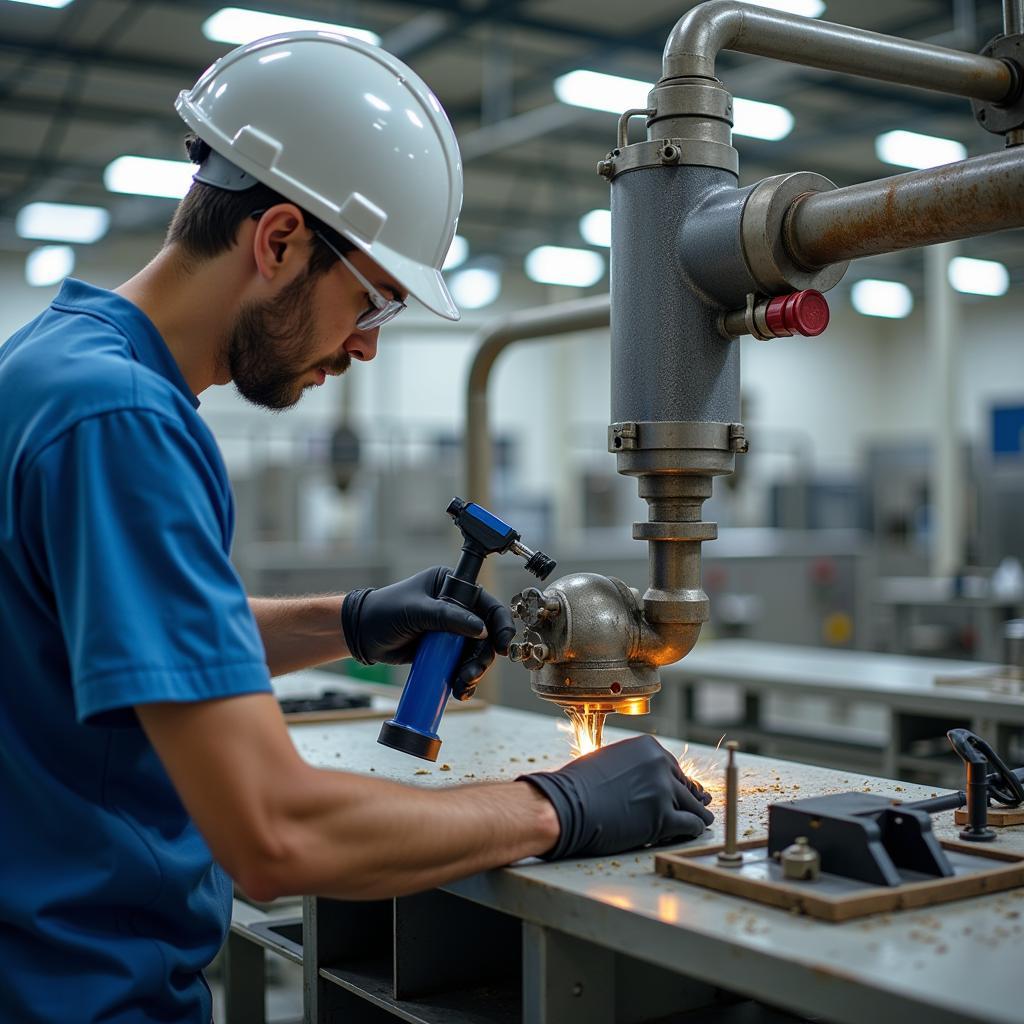Food Grade Solder is a critical component in many food processing and preparation environments. But what exactly is it, and why is it so important? This comprehensive guide will answer those questions and delve into the key aspects of food grade solder that everyone should know.
Understanding Food Grade Solder
In the simplest terms, solder is a metal alloy used to join other metal surfaces together. It acts as a bonding agent, creating a strong and permanent connection. Solder is widely used in various industries, from electronics to plumbing. However, when it comes to food processing and handling, not just any solder will do. That’s where food grade solder comes in.
Food grade solder is specifically engineered to be safe for use in applications where it might come into contact with food. This means it must meet stringent standards to ensure it doesn’t contaminate food with harmful substances.
Key Characteristics of Food Grade Solder
Food grade solder stands out from other types of solder due to its unique composition and properties. Here’s what makes it different:
-
Low Lead Content: Traditional solder often contains lead, a toxic metal that poses serious health risks. Food grade solder, on the other hand, is designed to have extremely low or no lead content. This minimizes the risk of lead leaching into food products.
-
Corrosion Resistance: Food processing environments are often exposed to moisture, heat, and acidic substances. Food grade solder is highly resistant to corrosion, ensuring it maintains its integrity and prevents contamination over time.
-
Durability: Food grade solder needs to withstand the rigors of food processing, including temperature fluctuations and mechanical stress. It is formulated to be durable and long-lasting, reducing the need for frequent repairs or replacements.
Applications of Food Grade Solder in the Food Industry
Food grade solder plays a vital role in various aspects of the food industry. Some common applications include:
-
Food Processing Equipment: From large-scale industrial machinery to smaller kitchen appliances, food grade solder is used to join pipes, fittings, and components in equipment that processes, prepares, or stores food.
-
Dairy Equipment: The dairy industry relies heavily on stainless steel equipment, which often requires soldering for assembly and repair. Food grade solder ensures the safety and purity of milk and other dairy products.
-
Beverage Dispensing: Solder is used in beverage dispensing systems, such as soda fountains and coffee machines. Food grade solder prevents metallic contamination and preserves the taste and quality of beverages.
-
Water Filtration Systems: Some water filtration systems use solder in their construction. Food grade solder guarantees that the filtered water remains safe for consumption.
The Importance of Using Food Grade Solder
Using the correct type of solder in food-related applications is not just a matter of best practice; it’s a legal requirement in many countries. Here’s why it’s so crucial:
-
Public Health: The primary reason for using food grade solder is to safeguard public health. By minimizing the risk of metallic contamination, it helps ensure that food remains safe for consumption and prevents potential health problems associated with heavy metal exposure.
-
Regulatory Compliance: Government agencies worldwide have strict regulations regarding materials that come into contact with food. Using food grade solder helps businesses comply with these regulations and avoid legal issues.
-
Brand Reputation: Food safety is paramount for any business in the food industry. Using food grade solder demonstrates a commitment to quality and safety, protecting brand reputation and consumer trust.
 Food Safety Inspection of Equipment with Food Grade Solder
Food Safety Inspection of Equipment with Food Grade Solder
Identifying Food Grade Solder
When selecting solder for food-related applications, it’s essential to verify that it meets the required standards. Here are some key things to look for:
-
Labeling: Reputable manufacturers clearly label their products as “food grade solder” or indicate compliance with relevant safety standards.
-
Certifications: Look for certifications from organizations like NSF International (NSF), which certify products that meet strict standards for public health protection.
-
Material Safety Data Sheet (MSDS): The MSDS provides detailed information about the solder’s composition and potential hazards. Review this document to ensure it’s suitable for food contact.
Conclusion
Food grade solder is an indispensable component in maintaining the safety and quality of our food supply. By understanding its importance, characteristics, and applications, we can make informed decisions that protect public health and uphold the integrity of the food industry. When it comes to food safety, using the right materials, such as food grade solder, is non-negotiable.
FAQs About Food Grade Solder
1. What are the common alternatives to lead-based solder in food grade applications?
Common lead-free alternatives include tin-silver, tin-copper, and tin-antimony alloys.
2. How can I tell if existing solder in my equipment is food grade?
It can be challenging to determine this visually. Consult with a qualified technician or the equipment manufacturer for guidance.
3. What are the potential consequences of using non-food grade solder in food equipment?
The consequences can range from product contamination and health risks to regulatory fines and damage to brand reputation.
4. Where can I purchase food grade solder?
Reputable welding supply stores and online retailers specializing in industrial or food-grade materials typically carry food grade solder.
5. Is food grade solder more expensive than regular solder?
Food grade solder might be slightly more expensive due to its specialized formulation and stricter manufacturing processes.
For any assistance regarding food grade solder or related products, please contact us at Phone Number: 02437655121, Email: minacones@gmail.com. You can also visit us at 3PGH+8R9, ĐT70A, thôn Trung, Bắc Từ Liêm, Hà Nội, Việt Nam. We have a dedicated customer support team available 24/7.